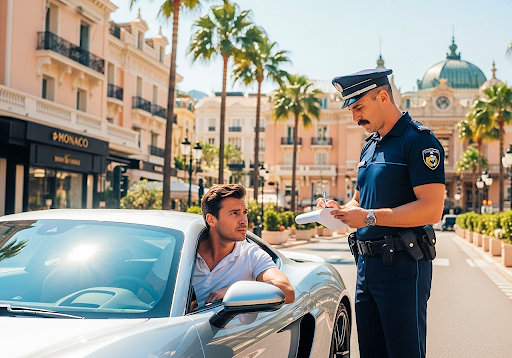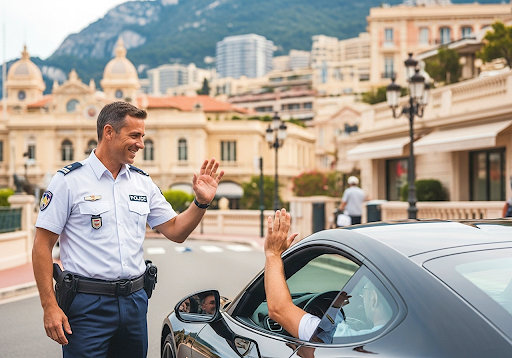How not to get fined in Monaco

Monaco's traffic enforcement extends beyond just speed and parking violations. The principality has zero tolerance for drunk driving, with blood alcohol limits stricter than many neighboring countries at 0.5g/L. Police conduct random breathalyzer tests, especially during evening hours near the casino district and after major events like the Grand Prix or yacht shows. Additionally, using a mobile phone while driving carries hefty fines — even touching your phone at a red light can result in a penalty. The use of hands-free devices is mandatory if you need to make calls while driving.
Navigation in Monaco can be particularly challenging due to its unique topography and numerous tunnels. The principality has seven public elevators and escalators that connect different levels of the city — these are free to use and can save you from driving through congested areas. When using GPS, be aware that signals often drop in tunnels, so familiarize yourself with your route beforehand. Many streets change direction during rush hours or special events, and temporary one-way systems are common. Always check for temporary signage that may override permanent road markings.
Motorcycle and scooter riders face additional regulations in Monaco. Helmets are mandatory for all riders and passengers, and motorcycles must use designated parking spaces — they cannot share car parking spots even if there's room. Lane splitting is technically illegal, though enforcement varies. Electric scooters and bicycles have dedicated lanes on certain routes, but riding them on sidewalks is prohibited and actively enforced. The principality has been expanding its network of charging stations for electric vehicles, with priority parking spots available for EVs in many public garages.
During major events like the Monaco Grand Prix, the Monaco Yacht Show, or the Monte-Carlo Rally, traffic patterns change dramatically. Streets become race tracks, parking becomes even more scarce, and prices for everything transportation-related skyrocket. If you're visiting during these times, book parking well in advance or consider staying outside Monaco and using public transport. The Monaco-Monte Carlo train station connects directly to Nice and other Riviera towns, making it a stress-free alternative to driving. Bus line 100 from Nice to Menton also stops in Monaco and costs just a few euros.
Environmental zones are another consideration — Monaco has been implementing increasingly strict emissions standards. Older diesel vehicles may face restrictions or higher parking fees. The principality offers incentives for electric and hybrid vehicles, including reduced parking rates and access to reserved charging spots. If you're renting a car specifically for your Monaco visit, consider choosing an electric or hybrid model to take advantage of these benefits. Remember that all vehicles must display a valid Crit'Air sticker (French emissions certificate) when entering from France, though Monaco itself doesn't require one for circulation within the principality.
Weather conditions in Monaco can create additional driving challenges that tourists often underestimate. During rare but intense Mediterranean rainstorms, the steep streets become extremely slippery, and visibility in the tunnels drops significantly. The drainage systems, while generally efficient, can become overwhelmed during heavy downpours, creating dangerous puddles at tunnel entrances. Winter months occasionally bring strong winds from the mountains that can make driving larger vehicles or motorcycles particularly hazardous on exposed coastal roads. Always reduce speed during adverse weather — Monaco's compact size means there's never a need to rush, and local drivers are accustomed to slowing down when conditions deteriorate.
The principality's valet parking culture is something many visitors find surprising but extremely convenient. Most luxury hotels, restaurants, and even some shops offer valet services, though fees can range from €20-50 depending on the venue and duration. This service is particularly valuable during peak season when finding parking yourself can take 30 minutes or more. However, be prepared to wait during busy times — valets often juggle multiple vehicles in Monaco's limited space. Always clarify the retrieval process and fees upfront, and keep your valet ticket secure as losing it can result in lengthy verification procedures and additional charges.

Cross-border considerations are crucial since Monaco is entirely surrounded by France. If you receive a traffic fine in Monaco but have a foreign-registered vehicle, the authorities have agreements with most European countries to pursue payment. Ignoring Monaco fines can lead to problems when returning to France or other EU countries. Additionally, if you're planning day trips from Monaco to nearby French towns like Èze, Cap Ferrat, or Antibes, remember that French traffic laws apply immediately upon crossing the border — this includes different speed limits, parking regulations, and potentially different toll road requirements. The transition is seamless with no border controls, but the rules change instantly, so stay alert to signage indicating which country's regulations apply.
Finally, be aware of Monaco's unique insurance requirements. While your standard European car insurance is valid, Monaco police may request proof of coverage during traffic stops. Keep your insurance documents easily accessible, along with your driver's license and vehicle registration. In case of even minor accidents, you must file a police report — attempting to settle privately can lead to complications later. The Monaco police speak multiple languages, but having a translation app ready can help ensure clear communication during any interactions with authorities.
